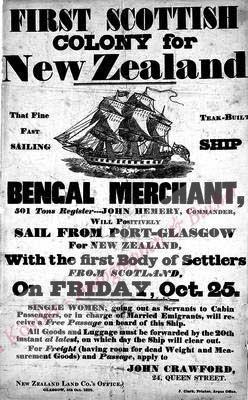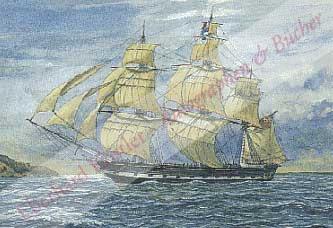Beschreibung
Letter of complaint signed by John Turner, James Wilson, T[homas] R[ichie] Simson, James Cullen and Pete Brown, Peter Dorran Sen., all steerage passengers on the Bengal Merchant, written in the name of 29 fellow travellers and addressed to Samuel Ravens Esq. Secretary to the New Zealand Land Comp. – The Bengal Merchant was the first ship which brought Scottish emigrants to New Zealand. On 30 October 1839 the ship, commanded by Captain John Hemery (1813-1881) and chartered by the New Zealand Company, left Glasgow. After almost 4 months the Bengal Merchant finally arrived at Port Nicholson on 20 February 1840. On 10 March 1840, the disembarkation took place at Port Nicholson which had recently been opened. On board were 30 married couples, 23 single men, 6 single women, 16 children younger than nine years, 4 children between nine and fifteen, and 13 babies younger than a year. One baby was born during the voyage, one passenger had died. Although both Cabin and Steerage passengers had paid for the voyage and the food supplies, the Steerage travellers obviously had many reasons to formulate the following complaint: „We the undersigners steerage passengers per Bengal Merchant Ship feel it our duty to inform you of the following deficiencies of our rations which have been kept Back from us by the Superintendant, Captain and others of the said ship. And when reference was made to the Commitee regarding our rations being kept back they got nothing but abuse for so interfering of which we refer you to the Gentlemen themselves. | Beef and Pork considerably above one third | Rice D[it]o| Oat Meal & Flour D[it]o one third| (The above deficiency was only to the 6th on Jan[uar]y 1840) | Coffee one third during the whole voyage | Mustard we had three weeks allowance altogether | Pickles – – Six weeks D[it]o […] One Cut [?] Bag of Biscuit was served us every second day until they became so Bad that we had two bags Bags which we had to pick the best off, the refuse was sent back which was about the one half and this lot would serve us three days. The allowance of biscuit the Eleven Messes [?] should have got each day was 96 lb so that we did not consume near two thirds of them.“ At the end of the letter the names of 29 Steerage passengers are listed, followed by the original signatures of the six passengers mentioned above. All the names are documented in the Bengal Merchants passengers list (see: www.geni.com/projects/New-Zealand-Settler-Ships-Bengal-Merchant-1840/13054). A unique and extremely rare document from the history of New Zealand at the time of the Treaty of Waitangi (6 February 1840), when New Zealand became a British colony. At the same time an extremely interesting document relating to the hard and dangerous sea travels the Scottish and other emigrants had to face before they could finally settle in their new homes. In autumn 1839 the New Zealand Company, which played a key role in the colonization of the country, sent the first five ships to New Zealand: the first, on 15 September 1839 was the „Oriental“, followed by the „Aurora“, „Adelaide“, „Duke of Roxburgh“ and the „Bengal Merchant“. When the Bengal Merchant passengers arrived at Port Nicholson on 20 February 1840, the Treaty of Waitangi had just been signed and Port Nicholson, later called Wellington Harbour, was still a small and poor town with only one boarding house (without any doors and windows) to host the emigrants. When the Scots arrived at Port Nicholson, no more than 1000 Europeans were living in New Zealand. Today many New Zealanders can trace back their roots to the passengers of the Bengal Merchant (cf. http://nzetc.victoria.ac.nz/tm/scholarly/tei-WarEarl-t1-body-d3-d4.html and https://familysearch.org/photos/stories/15826986).





